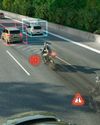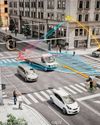Essayer OR - Gratuit
Need For Machine Learning Based Simulator Approach To ADAS Validation
Auto Tech Review
|October 2017
The global ADAS market is growing at a rapid pace and is expected to reach $ 60 bn by 2020 at a CAGR of 23 %, according to a report by Allied Market Research [1] with Europe and North America being the key geographies driving this growth. In order to make way for this rapid growth, investments are being made by various constituents of the value chain such as silicon vendors, OEMs, and sensor manufacturers along others to capture a pie of this market. This is resulting in innovations in chip design, artificial intelligence (AI) and deep learning, radar, and computer vision-based solutions, which are key to realising vehicle autonomy.
-

As ADAS features become more mainstream, one of the major challenges industry faces is achieving economies of scale so that the technology moves to mid-tier segments, where the volumes are present. Another challenge is the lack of standardisation for exchange of information between various sensors, vision based systems, radars, et cetera, in a car’s network.
Increasing system complexity due to multiple sub-systems being integrated in autonomous cars and the need to process the output data in real-time is also becoming a challenge. As standalone ADAS features transition to autonomy, cars will be making decisions based on AI and deep learning, and would hence require lengthy and expensive validation cycles. With regulations for autonomous cars still evolving, it becomes necessary for technology providers to ensure that the systems are compliant with increasing regulatory requirements. The issue of liabilities in case of mishaps is a complex question that does not have a simple answer. This therefore requires a validation strategy that is aligned with this changing and evolving landscape.
As per a study conducted by Rand Corporation [2], autonomous vehicles have to be driven for 275 mn miles to demonstrate with 95 % confidence that their failure rate is almost 1.09 fatalities per 100 mn miles. This is a huge ask and gives a perspective of the validation task that lies ahead for the industry. This is primarily due to the fundamental departure from state flow-based design, where co-relation between input and output can be established to machine learning systems, and where the decision taken is not so apparent since it is based on probabilistic models and also on what the machine has learnt over a period of time.
Cette histoire est tirée de l'édition October 2017 de Auto Tech Review.
Abonnez-vous à Magzter GOLD pour accéder à des milliers d'histoires premium sélectionnées et à plus de 9 000 magazines et journaux.
Déjà abonné ? Se connecter
PLUS D'HISTOIRES DE Auto Tech Review

Auto Tech Review
Sound Generation For Enhanced Road Safety
With an ever-increasing number of fully electric and hybrid vehicles entering the market, we are witnessing a change in the acoustic experience in and around the car. The silent nature of the electric powertrain means that other road users miss the familiar acoustic cues that warn them of an approaching vehicle. To remedy this situation, Harman is working on various noise management solutions.
6 mins
August 2020

Auto Tech Review
OBJECTIVE ASSESSMENT OF THE SAFETY CONTRIBUTION OF TODAY'S AUTOMOTIVE HEADLAMPS
Good lighting makes a major contribution to road safety. In 2011, the International Commission on Illumination (CIE) presented an evaluation system for headlamps that can objectively assess the quality of illumination and glare limitation. New light sources like LEDs and lighting functions (glare-free high beam, partial high beam) have been available for several years, so that an extension of the proven CIE method is necessary, which takes into account, among other things, changed switch-on and service lives of new lighting functions and represents a generally understandable evaluation system. An evaluation system presented in the following by the Technische Uni versität Darmstadt, which was developed by an encompassing expert commission, is intended to provide representative data and enable an objective evaluation of headlamp performance.
8 mins
August 2020

Auto Tech Review
RAPIDO RE-INNOVATES TO CATER TO POST COVID-19 LAST MILE CONNECTIVITY
The rapid pace of urbanisation in the country has witnessed cities expanding and subsuming surrounding villages and smaller towns, evolving into Tier II and III cities.
5 mins
August 2020

Auto Tech Review
FUNCTIONAL SAFETY STANDARDS TOP PRIORITY FOR FUTURE AUTOMOTIVE DEPLOYMENT
Increasing levels of electronic content in vehicles result in a large amount of software that is required to run the scenes behind the mechanical aspects of a vehicle. Electronic systems in automobiles are part of every section, from the powertrain to comfort and convenience systems as well as all types of safety equipment. This makes electronics and the software running these systems a critical part of the equation for future mobility solutions. In addition, putting standards in place to measure methods of developing, testing and functioning of such electronic systems also becomes highly relevant.
5 mins
August 2020

Auto Tech Review
“BYD'S EV STRATEGY TO ENCOMPASS MOST FORMS OF TRANSPORTATION NEEDS IN INDIA”
The country’s electric vehicle (EV) ecosystem is grappling with a plethora of challenges even as it is striving to wriggle itself out of the ‘nascent stage’ tag. In an exclusive chat with Auto Tech Review, Zhang Jie Ketsu, Executive Director, BYD India shares his perspective on the current EV scenario and how the company intends to progress faster in the Indian automotive industry
7 mins
August 2020

Auto Tech Review
SAFETY IN ELECTRIC AND AUTONOMOUS CARS – SIMULATION OF COMPLEX CRASH SCENARIOS
Electric and autonomous vehicles allow for novel seating arrangements and packaging strategies, presenting new safety challenges. Physical crash testing must be supplemented with virtual simulation to ensure vehicle safety on shorter development cycles. With its Simcenter Madymo MBS software, Siemens provides improved runtimes and the Active Human model, enabling accurate and rapid occupant safety analysis in complex crash scenarios.
6 mins
August 2020

Auto Tech Review
KIA SONET – A MIGHTY OFFERING IN THE COMPACT SUV SEGMENT
It wouldn't be wrong to say that Kia Motors India has taken the Indian market by storm in less than 12 months of its presence in the market.
4 mins
August 2020

Auto Tech Review
NISSAN'S NEW DIRECTION: ARIYA ALL-ELECTRIC
Marking a key milestone in Nissan’s transformation strategy, Ariya ticks a lot of boxes highlighting the strengths of the global automotive giant.
5 mins
August 2020

Auto Tech Review
BETTER SAFETY WITH EMERGENCY BRAKE ASSIST FOR MOTORCYCLES
Rear-end collisions with a slower vehicle suddenly cutting into the lane and intersection accidents with cross-traffic are among the most frequent motorcycle accident types. Continental is now developing an emergency brake assist, which detects an imminent collision with a vehicle ahead or with an obstacle, warns the rider and supports him during braking
7 mins
August 2020

Auto Tech Review
ADAS WILL SERVE AS CATALYST FOR IMPROVED VEHICLE SAFETY
The automotive industry across the globe is increasingly focussing on safety.
5 mins
August 2020
Translate
Change font size
